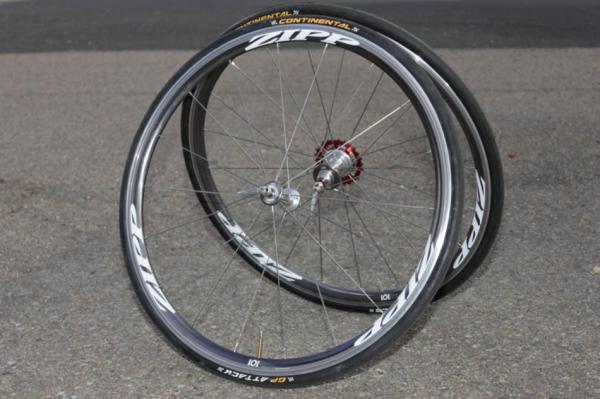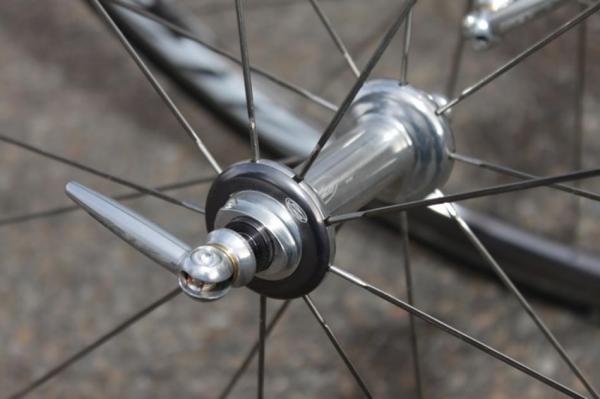Product review: Zipp 101 road wheelset
Underwhelms on paper but performs well and looks good on the road


Going solely by the numbers, Zipp's 101s doesn't seem all that impressive. The 30mm, fully toroidal, 6000 series alloy rims make for a somewhat heavy overall package at 1,592g (with rim strips; skewers add another 76g).
In fact, the 101s are heavier than both Mavic's Ksyrium Elites, which cost roughly half as much, and Shimano's carbon Dura-Aces, which are a favourite of ours for their tubeless compatibility and traditional loose ball hubs. The fact that much of the Zipp wheels' weight is in the rim gives them a slightly sluggish acceleration that's noticeable on the bike.
What the 101s lack in lightness, however, they make up for in ride quality. The rims are wide and reasonably tall when compared to other alloy models. Both features lend a surefooted feel that will be appreciated by most every rider. The wide profile also allows for a reasonable amount of give, when compared to deep carbon rims.
The rims' 16mm inner width – roughly 2mm wider than standard – takes your favourite road clinchers and changes their shape for the better in almost all instances. Cornering characteristics, straight line drive and bump absorption are all improved because of the rim's influence on tyre shape. In fact, performance improves exponentially as the size of the tyre increases from 23mm to 25mm and larger.
We tested the 101s with 23mm and 25mm Continental rubber as well as a pair of 32mm Challenge Fango cyclo-cross tyres. While every combo we tried performed well, the 25mm road tyres and Fango 'cross tyres seemed to reap the greatest rewards. The road tyres ate up tricky mountain descents with great confidence and the rims supported the 'cross tyres in a way that reduced folding at lower pressures, which in turn encouraged the running of even lower pressures.
The bummer here is that you're still dealing with clinchers, which means you need to be wary of pinch flats and dented rims; the latter is a serious issue considering the wheelset's cost. While the 101s work really well with 'cross tyres, bear in mind that they're still clinchers and there are better tubular or tubeless options out there.
It's not just on the descents where the 101s excel; they're also good on dirt roads and rough surfaces, where the rim profile enhances tyre grip and bump absorption. While acceleration is slightly slugglish, wheel stiffness is good, which helps minimise the effect of the added mass. It also helps the wheels track on descents, as well as offering a good platform for sprinting.
Get The Leadout Newsletter
The latest race content, interviews, features, reviews and expert buying guides, direct to your inbox!
The extra inertia of the heavy rims means that, once up to speed, they roll fast and feel as though they're helping to maintain your pace – an attribute you often feel with heavier deep section wheels but rarely with reasonably light alloy wheels. Zipp is always keen to talk about the aerodynamics of its wheels, and this is an area where that may come into play. However, assessing the aero qualities of wheels like the 101s while riding is about as easy as landing a 747 on a short runway – in a snowstorm.
Hubs and spokes
The fully toroidal alloy rims are laced to Zipp's top-of-the-line 88/188-hubset with 18 front and 20 rear Sapim CX-Ray spokes. The front wheel is laced radially, while the rear features radial driveside lacing and one-cross non-driveside lacing. The hubs are machined from a proprietary Z310.9 alloy in Speedway, Indiana – where the 101s are built alongside Zipp's carbon options. They feature steel cartridge bearings, 17mm axles, external preload adjustment and aero end caps.
Zipp make the 188 rear freehub internals using wire EDM, a notably high-precision – and expensive – process that yields a claimed 50 percent jump in hardness and a 20-fold improvement in dimensional tolerances, since there's no final heat hardening required that could warp the piece. Before the introduction of this hubset we'd have said that hubs were the Achilles heel of Zipp wheels, but since riding the 88/188 combo we've yet to be let down by their performance.
Overall, the 101s do a darn good job of finishing off a high-end road bike for everyday training and riding with virtually no compromise. They're more exciting than most of the competition, and if you disregard the US$1,300 price tag, they're every bit as practical. If we were judging these wheels on performance alone, we'd give them 4 out of 5 – and if they were tubeless that would rise to 4.5 out of 5. However, considering their price, we feel a 3.5 out of 5 is the most appropriate score.
Specifications
Zipp 101 clincher
Available colours: Silver
Spoke gauge: aero - 2.0/2.3*0.9/2.0mm
Weight (pair): 1592 g
Tyre type: Clincher
Accessories: Q/R skewer
Joint: Welded
Hub material: Z3 10.9 Alloy Shell / Alcoa 7XXX Axle
Quick releases: Yes
Spoke material: Stainless Steel
Spoke type: Profiled Straight Pull
Spokes brand: Sapim
Spokes lacing: Radial (front)
Price: $1300.00
More information: www.zipp.com
Cyclingnews rating: 3.5 stars